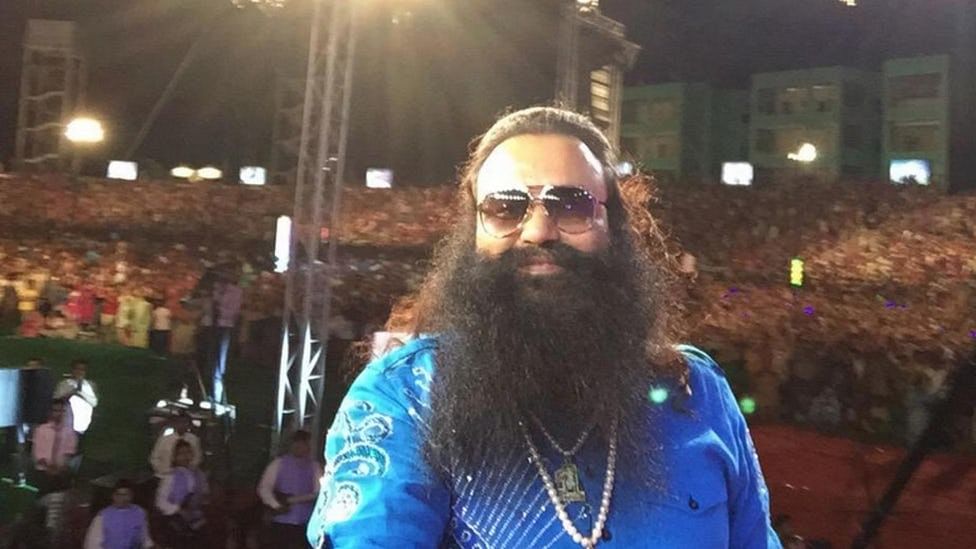The godman, who influences local politics, has devotees who see nothing wrong with resorting to violence after his conviction in a rape case.
The Messenger of God was forced to bow before the secular power of the state, as CBI special judge Jagdeep Singh scripted one of the finer moments in India’s judicial history. Refusing to be intimidated either by Gurmeet Ram Rahim Singh Insaan’s army of followers, who were camped menacingly on the court’s doorstep, or his influential political network, he convicted the Dera Sacha Sauda chief of rape.
The two notable aspects of the courtroom drama-gone-viral are the inglorious role played by the political class and the fanatical devotion the godman commands. This devotion is despite the heinous accusations against him – from murder (two cases), rape and child abuse to castrating his own followers. Why was the BJP-led Haryana government visibly reluctant to rein in Ram Rahim’s army, knowing well that an adverse verdict would spark a riot?
The obvious answer is that Ram Rahim commands a vote bank and was instrumental in the BJP’s 2014 victory in Haryana – to the extent that party general secretary Kailash Vijayvargiya felt compelled to take a helicopter to Sirsa after the polls to meet and thank the godman. The Congress has also sought to parley Ram Rahim’s following into votes in the past and cannot, therefore, take the high moral ground.
That said, Ram Rahim is not the only godman with the ability to influence electoral outcomes. However, he is one of the few who is willing to do so. The Radhasoami Satsang head, ‘Babaji’, commands a following as big, or perhaps even bigger, but steadfastly refuses to meddle in politics. And unlike the wannabe rockstar-cum-film hero Ram Rahim, he shuns publicity. Sadhguru Jaggi Vasudev, likewise, insists that he will not undermine democracy by giving his disciples a political direction.
The ‘Love Charger’ guru’s appeal – and he certainly is charismatic – extends across all classes, particularly a large OBC following. His chief aide is a medical doctor and he counts many highly educated individuals as devotees.
Even the horrifying charge – which is under investigation by the CBI since 2014 – that 400 members of his flock were castrated by Dera doctors, or his crazy costumes and passion for playing the celluloid superhero, have failed to dent his devotees faith. For them, he is the ‘victim’ of a conspiracy. He is ‘reaching out to youth’ through his rock performances. He is highlighting ‘social evils’ through his films.
The devotee is so invested in the purity of his guru, who gives him an identity and purpose, that he will not tolerate any disparagement. The godman is always right, even when he is wrong. Having accepted him as your guru, the devotee will follow him blindly. The social consequences of their actions, whether positive or negative, are irrelevant. The devotee is not crazy – he just places a higher value on the godman than on social relationships, or his personal well-being. It is, in effect, consensual brain-washing.
This relationship is open to abuse. The godman may sexually exploit his followers – like Asaram Bapu, Nithyanand Swami – or use them as cannon fodder, as Ram Rahim is now doing. Baba Rampal took on the Haryana state police in 2014 while evading arrest, resulting in the death of four women. The toll the Ram Rahim saga will take, given the state government’s failure to control his flock, can only be guessed.
The social consequences of the guru’s actions, whether positive or negative, are irrelevant. This explains the outpouring of anger by the Dera devotees. Followers of Mata Amritanandamayee in Kerala were similarly enraged when a book alleging dubious practices at her township was published.
As for the politicians, apart from vote banks, they understand the power of cultural symbols in Indian society. Therefore, they have no desire to be seen as opposing spiritual leaders like Ram Rahim. The Congress government in Karnataka has shown extreme reluctance in investigating the head of the Ramachandrapura Mutt, Raghaveshwara Bharthi, who is accused of sexually exploiting his devotees.
A little-discussed aspect of the political class is its intense superstition. The high-risk nature of their profession, which demands a huge investment in time, money and energy and is vulnerable to a number of variables, drives politicians to seek divine intervention. Before elections, astrologers, gemologists and swamis are in great demand and conducting pujas and mahamritunjaya yagyas is not uncommon. A message to the almighty, delivered by an intermediary, might just do the trick.
Bhavdeep Kang is the author of book titled “Gurus: Stories of India’s Leading Babas”.
